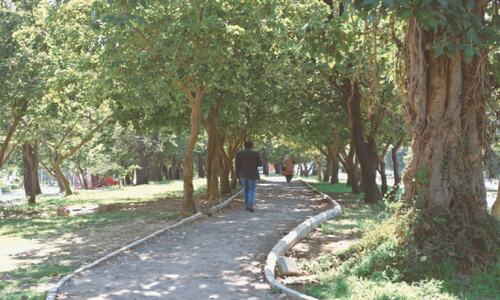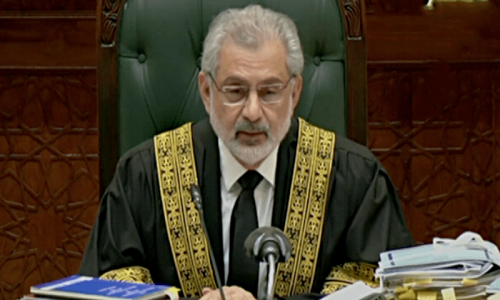ISLAMABAD: The Supreme Court has sought the assistance of two retired inspector general of forest (IGF) to determine whether the Capital Development Authority’s (CDA) removal of trees and vegetation from the F-9 Fatima Jinnah Park in accordance with good practices and how best to proceed it with in the future.
Headed by Chief Justice of Pakistan (CJP) Qazi Faez Isa, a three-judge Supreme Court bench through a written order issued here Monday directed the court office to dispatch the copies of its orders to former IGFs namely Mahmood Nasir and Syed Ghulam Qadir Shah. The court also ordered that until the next hearing no further trees would be cut nor the CDA would undertake further deforestation.
“We are greatly concerned with the manner in which the land has been cleared of all vegetation, not just paper mulberry trees,” the order observed, adding it would be appropriate to seek the assistance of the two IGFs in this regard.
The Supreme Court had taken up a notice under Article 184(3) of the Constitution on a suo motu after the Registrar of the Supreme Court put up a note before the three-judge committee constituted under section 2 of the Supreme Court (Practice and Procedure) Act, 2023 to consider whether proceedings may be commenced since reportedly a larger number of trees have been cut and there was systematic deforestation taking place at the Fatima Jinnah Park, F-9.
Court bars CDA from felling trees till next hearing; 7,000 trees so far removed
Besides, the citizens were complaining that the trees had been cut on the order of the CDA. They said the Supreme Court should intervene to prevent this valuable resource of the citizens from being destroyed.
The order stated that pursuant to Feb 27 directions in respect of the tree-cutting/deforestation taking place in the Fatima Jinnah Park, commissioners appointed by the Supreme Court had submitted their joint report and video recordings.
In case the CDA has any objection to the report the same be filed before the next date of hearing, the order said, adding the CDA has also filed a report in response to the questions raised and informed the court that it did massive plantation in the 1970s of paper mulberry trees (Broussonetia papyrifera), but later discovered that it causes pollen allergy.
Therefore, it was decided to remove all such trees from Islamabad, including from the park which has their largest concentration. Thus an ‘open auction notice’ was published by the CDA director environment inviting bids from contractors to undertake the removal of paper mulberry trees and other invasive species.
7,000 paper mulberry trees removed
As a result, Shah Nazar was selected as the contractor since he offered the highest amount for the timber to be removed, which was Rs5.2 million at the rate of 66.94 per cubic foot.
As per the CDA, approximately 7,000 paper mulberry trees were removed from different patches and packets of 55 acres of the park.
However, photographs and recording shows that the area has been denuded of all trees and vegetation, the report said adding when the court enquired whether the paper mulberry trees were marked, it transpired that the work was undertaken by the contractor himself.
It would be in the interest of the contractor to remove other trees too whose timber value is greater, the order said, adding that the CDA employed about 4,500 gardeners but they could not have undertaken this work because, as the court was told, the “CDA does not have the requisite tools to uproot the trees”.
The court also questioned the modalities of the contract, saying the “appears to have worked unsupervised”. All trees and vegetation seem to have been cut, despite the fact that they take years to grow and play a useful role, the court regretted.
Published in Dawn, March 19th, 2024














































Dear visitor, the comments section is undergoing an overhaul and will return soon.